Introduction
One of gaming’s most unique strengths is its ability to afford players the chance to engage with societal roles that they otherwise probably would never get to see for themselves. While a video game’s nature as a piece of art and entertainment may regularly fall short of providing any practical wisdom regarding any of the roles it puts us in, it nonetheless can still provide powerful opportunities to think about the lives of people that are otherwise remote from ours. After all, if we play as a soldier and find ourselves vexed while trying to clear a firefight which we’re free to trial and error from a checkpoint, imagine the difficulty and stress that actual soldiers face whose “D” on their K/D/A is 0 only because they literally can’t afford to let that happen. It was this line of thinking that captured my imagination when I played today’s title, and a review of the complete package quickly became inevitable.
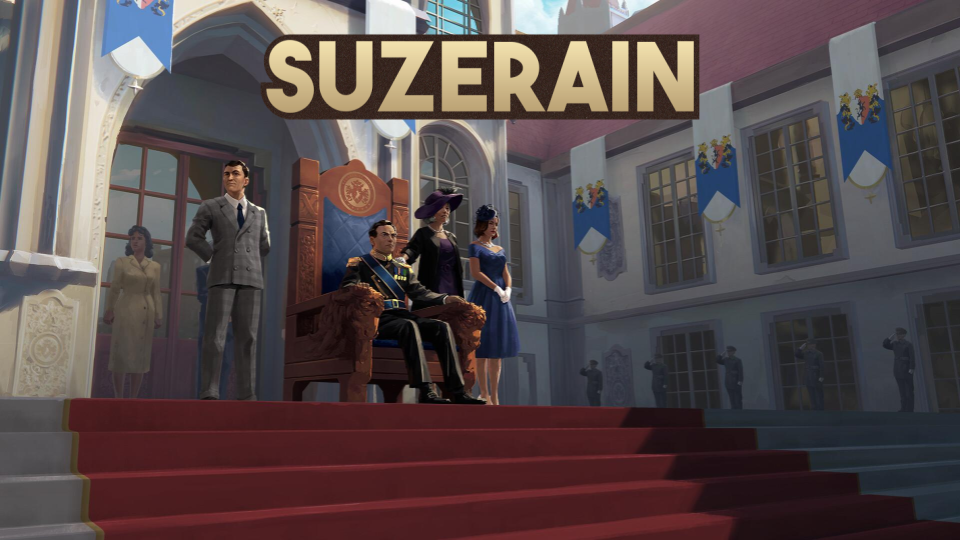
Developed by Torpor Games, co-published with Fellow Traveler, and released in 2020, Suzerain is a narrative political simulation game available on PC, Mobile, and Nintendo Switch. A major DLC pack called Suzerain: Rizia was also released in March 2024 (as of now I believe for PC only), and both the base game and expansion shall be discussed today. The game’s premise involves taking up the role of political leaders in a fictional world vaguely similar to our own from the 1950s and navigating unique domestic and geopolitical challenges, in hopes of bringing about whatever change to the nation you desire. Players interact with the game pretty much entirely through reading, as the gameplay is mostly just selecting from multiple dialogue options. Please note I played the Steam version of the game on patch 3.0.9, so the platform you choose to play may contain a different experience, and elements of the game may be added or changed in future versions.
Suzerain (Sordland)
The story of Suzerain is set in the Republic of Sordland in a fictional universe vaguely like our own in the year 1954, and follows the tale of President Anton Rayne. A good amount of background details surrounding Anton are left up to player fiat, but much can be said about the history of the country surrounding him. Ranye had lived to see many shifts in the Sordish landscape throughout his life, from democratic ideals overthrowing the monarchy in his youth, to civil war as a young man, to major economic reforms ushered in by his predecessor. The game properly begins with his election to the office of President, and Sordland has a wealth of issues to say the least. From the economy on the brink of depression, to government corruption and power imbalances between federal branches, to the many civilian interest groups with desires that often conflict violently, and plenty of other issues, there is no shortage of fires for President Rayne to put out in the time he has before reelection. The path he follows from there is mostly up to the player.
The vast majority of the plot simply focuses on presenting the player with the concerns in the country, giving ample time to examine the issues exhaustively, and coming to an executive decision. As you progress through the game you’ll get to see earlier choices restrict or expand your options and have an impact on the lives of your family and the country around you, with the later parts of the game featuring events that are completely missed or optional depending on the culmination of your decisions. In this sense it’s actually quite hard to discuss the events of Suzerain in a way that reflects broadly on its characters and events, either due to spoilers or because their development is dependent upon the player’s actions. On balance though, the story of the game is very enjoyable precisely because it’s fun to discover lines of cause and effect as your choices pile up. Beyond just choice though, the worldbuilding of Merkopa and the fictional universe as a whole is insanely detailed, While it takes a certain kind of person to actually want to explore the in-game codex and read every new newspaper article, choosing to do so not only makes the entire game richer but makes one way more informed on the choices they will eventually have to decide on. If there was any criticism against the story of Suzerain you could levy it would probably be its character writing. Considering the effort that went into the other parts of the narrative I understand why the vast majority of the cast is static, but it’s not an understatement to say that the sheer stubbornness with which most of the characters hold to their ideas of how the country should be run can get a little grating.
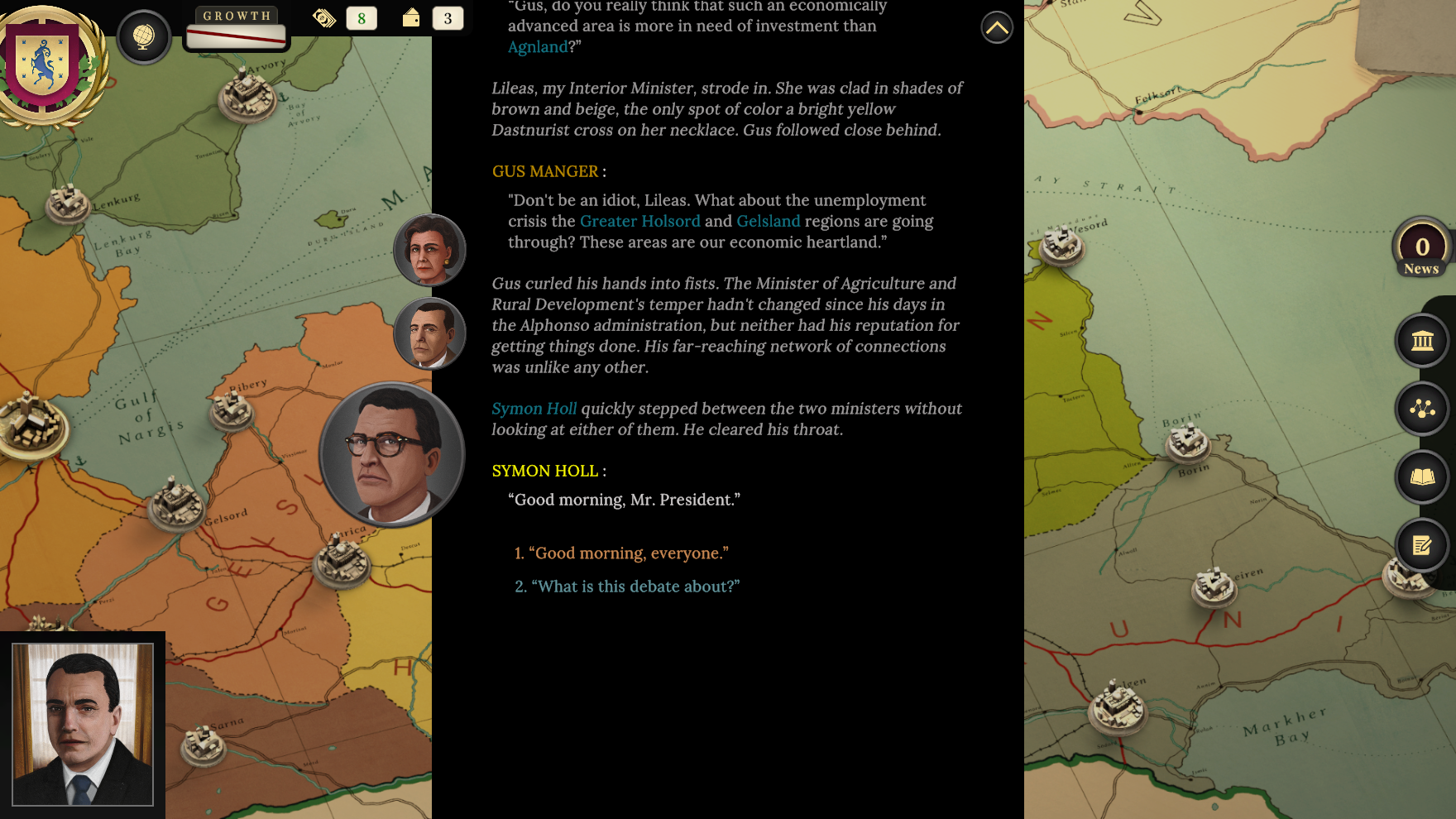
For a game that illustrates the art of balancing and compromise pretty well, it often feels like Rayne is the only person in the room who actually understands the importance of compromise, which comes across as odd. Perhaps the best example of this would be your wife Monica, whose subplot basically exists to emotionally cudgel you into diverting time and resources into a women’s rights movement on top of all the madness you’re already dealing with, and she really never apologizes for not considering how ill-timed her activist push is. Not that protecting women isn’t a good and noble thing to do, especially considering at the start of the game domestic abuse isn’t criminal in Sordland, and when the chips are down I’d choose letting my wife get involved in politics over getting divorced. But the fact that you HAVE to let her into politics or else face a divorce comes across as kind of cheap, and ironically undercuts the idea that women have it rough in Sordland when the threat of no-fault divorce gives Monica power over literally the most powerful man in the country. But I digress, we’ll address the implicit politics in the game near the end of the review. For now I’d say that the game’s story is quite good. While being lighter in places a traditional story would need to care more about, it makes up for it by having some incredibly engaging back and forth with the player’s choices. This might be one of the most successful executions of the ‘choices matter’ approach I’ve played to date, and if that stuff interests you then this will be a real treat.
As far as gameplay goes in Suzerain… well the majority of it really is just reading and making decisions. The main meta-system is the Government Budget, which governs your ability to make major decisions. This can be spent to initiate projects or sign certain bills which will, either immediately or eventually, update your situation tracker which displays the general state of the current issues in your country. The game can be fairly esoteric in regards to whether or not Anton Rayne is headed towards a happy ending or not, but the situations tracker does give you a good idea of what problems you might want to address if an opportunity to do so arises. You’re also free to spend over budget if you wish, but this naturally has consequences in the story that you may not particularly like. Beyond that the only major meta system is the selection of election promises you make at the beginning of the game, which creates an incentive to explore different areas of the game’s branching paths on repeat playthroughs.
Moving along to the game’s presentation, which I’ll combine here with the Rizia DLC, it’s mostly utilitarian in character. For most of the game you’ll be looking at a scroll of conversation text with the portraits of the characters involved moving around to indicate who’s speaking. The portraits themselves strike a good balance between style and realism with the characters having designs thoroughly rooted in the still-life portraits of yesteryear. They have just enough of an artist’s touch to be pleasant while still chiefly seeking to represent a believably existing person. The main visual besides the text and portraits is the map of both your country and of the wider Merkopan continent, and while simple, it really adds to the feeling of planning your next move. The map features dozens of noted locations which exist purely to make the world feel bigger than the key locations the stories focus on, and if you scroll to the edges of the maps you’ll find official documents and desk implements strewn about to really sell the strategy room atmosphere. Overall pretty cool, but definitely not what’s going to stick out to you long term when so much of the visuals are constructed in your imagination at the end of the day.
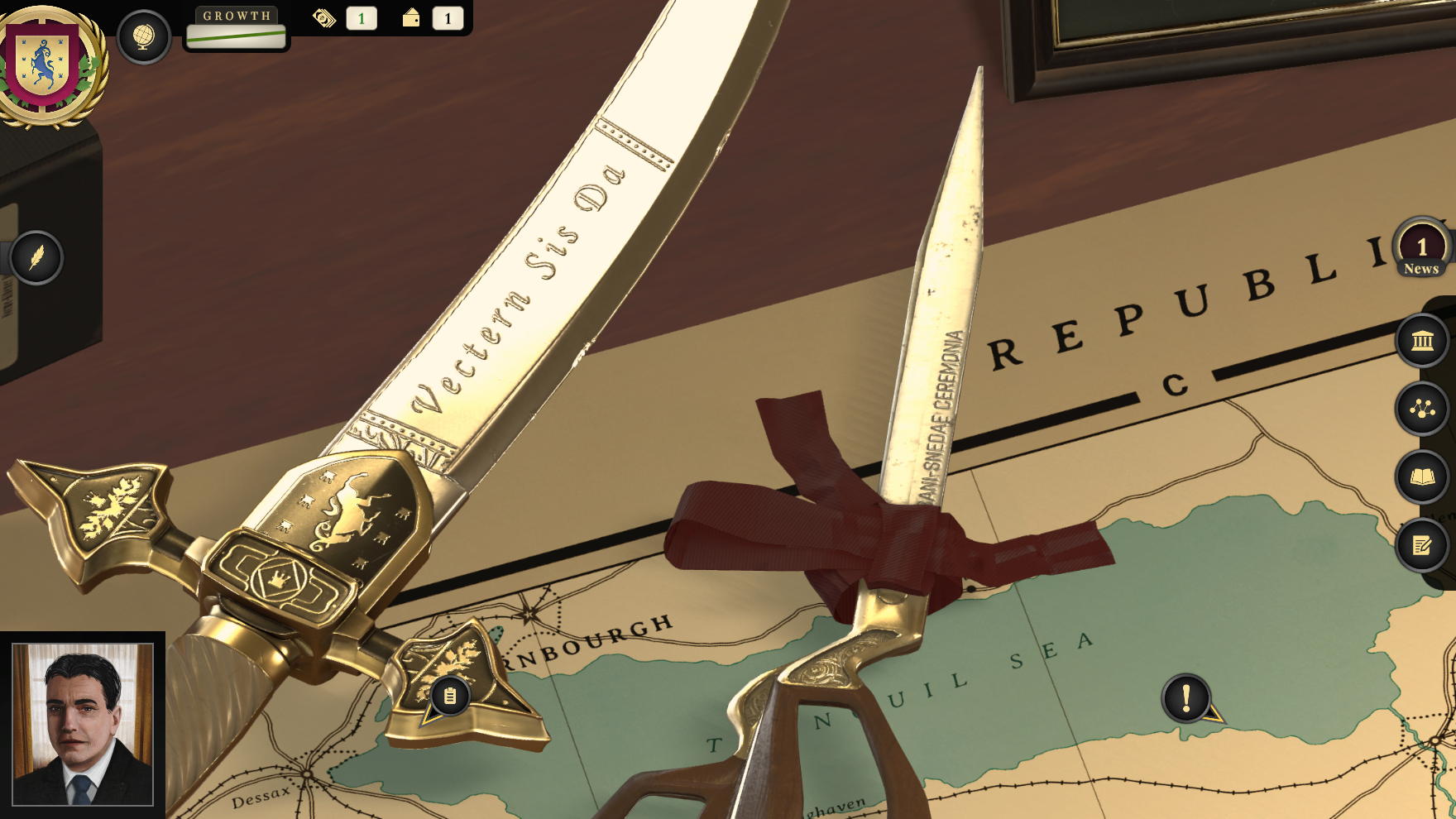
As for the music, it’s surprisingly good. It’s another one of those soundtracks that knows it’s in the background and doesn’t really see the need to capture your attention beyond whatever’s needed to elicit the proper emotions, but honestly it still manages to become a key factor in the game’s overall quality. The original game’s soundscape is dominated by a soft electric guitar, while Rizia features a more robust set of classical instrumentation with some emphasis on the violins and especially the piano. Naturally I’m partial to the DLC’s classical soundtrack but base Suzerain’s unique instrumentation is no less enchanting. You’re much more likely to put this one while doing chores rather than to simply listen, but among that particular category of music it is top tier.
So to summarize, the base game of Suzerain is an extremely interesting narrative game full of challenging decisions to make, with tangible consequences being a huge highlight. The gameplay is almost non-existent but if being challenged to pull a struggling country together by critically examining the various strategies available to you and blazing a path forward amid uncertainty sounds exciting to you, it might just pull you in and keep you engaged all the way until the end of Rayne’s first term. There could have been more done to flesh out the cast of characters beyond simply pushing for their own agendas and getting ornery when you don’t agree, but on the whole it’s a great ride from start to finish. The question now is, what could be so different about the game’s DLC that merits a whole separate section? Plenty, actually.
Suzerain: Rizia
Before I begin, I would like to leave another disclaimer that the game’s current version is 3.0.9. The devs are currently working on further updates which will likely add more story content and adjust some of the numbers under the hood. While the DLC campaign is hardly unfinished, there will be additions which may affect your experience of the narrative.
Suzerain: Rizia takes place in the titular kingdom starting in the year 1950 and follows the story of the newly crowned King Romus Toras. Romus still has plenty of details about his past colored by the player, but there are more details about his past set in stone such as his arranged marriage resulting in his only daughter Vina, or the time he was taken hostage by a rebelling noble house. In any case the kingdom that King Romus inherits isn’t nearly as unstable as Anton’s republic, but it still has major challenges domestically and internationally. The stand out being the occupation of the Zille region by Whelen and the region of Pales having broken away into an independent Grand Duchy. The story then follows the king over the next eight years, examining what actions he takes to amend the scars on Rizia’s past and secure the country’s future in a world that grows increasingly contemptuous of the kingdom’s very existence.
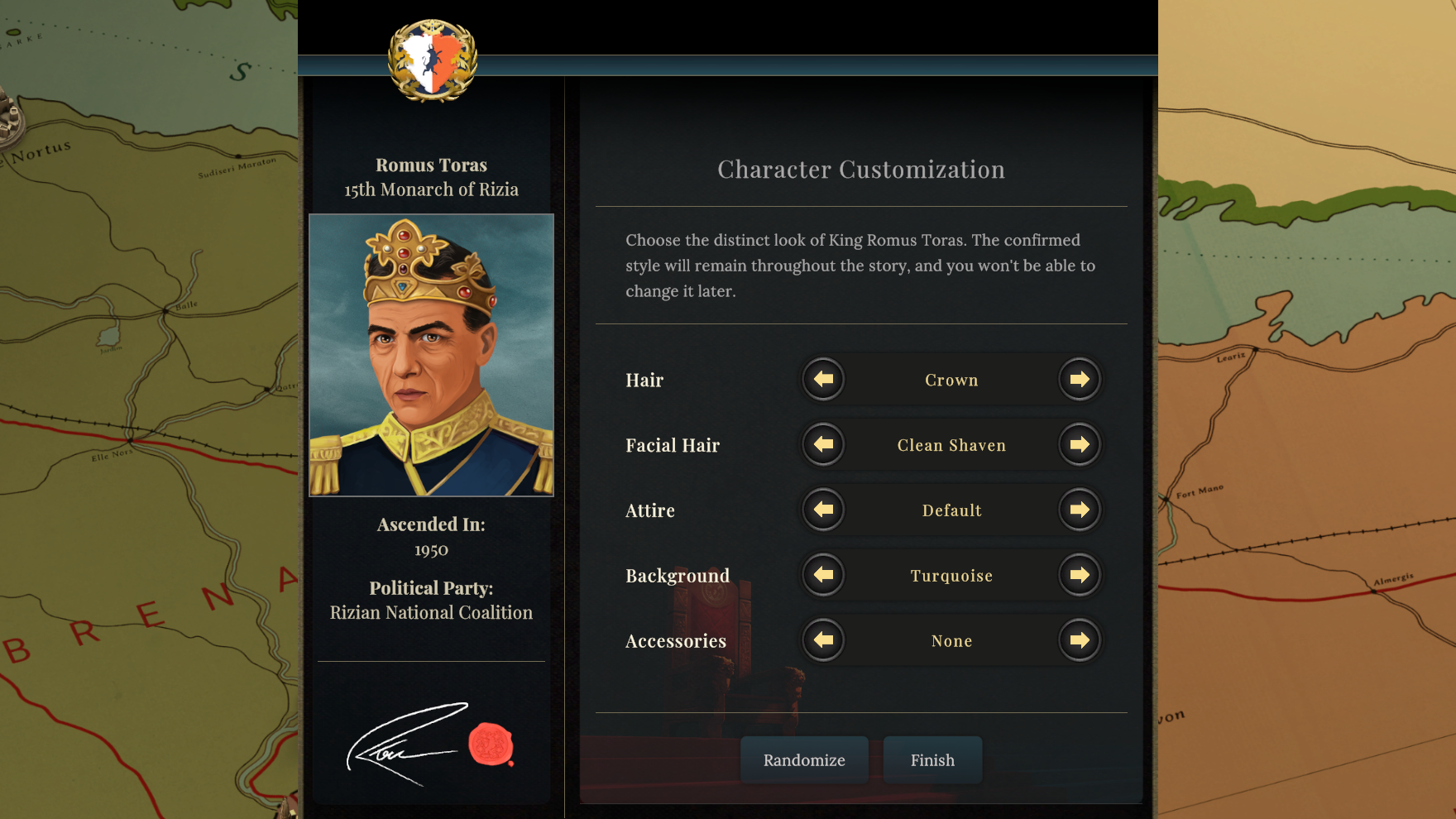
In comparison to the base game, I actually enjoy the story of Rizia more. Domestically the cast of characters is a much tighter group who don’t have to have their appearances limited to mostly business meetings. This provides an opportunity to get to know your advisors better both professionally and personally, and much unlike Sordish politicians your councilors have a much better respect for the nuance of your decisions, although you’ll still need to give them sound reasoning to keep them happy and loyal. Being a monarchy also makes the family side of the story way more in-depth and important, giving the affairs a much more personal dimension. International relations are also way, way more involved this time around. From keeping up relations with your sister-in-law from the Kingdom of Rumburg to navigating the sovereignty power plays by Pales and the Republic of Morella and more, diplomacy is far more integral to the story and leads to some incredibly memorable scenes. There’s even a prominent role of religion both domestically and internationally, which provides plenty of time to reflect upon and play out the role of faith in governance and the competing needs of different religious groups.
The big criticism that some have for this campaign is that as a king you don’t necessarily get a clean endpoint for the story unless you intentionally find a way to abdicate (like a chump), but I say there are certain landmark events that can take place during Chapter 3 which feel like natural climaxes in my eyes. This is especially true if your bids to reunite lost territory are going well. On the whole I just found Suzerain: Rizia to be a case of a sequel that was able to improve upon its foundations in just about every way. I’m actually not sure if any future story packs will ever reach the same heights as this one, as the geopolitical situation of Rizia and the benefits being a monarch has on power dynamics and familial relationships simply coalesce into a perfect setup for an engaging tale.
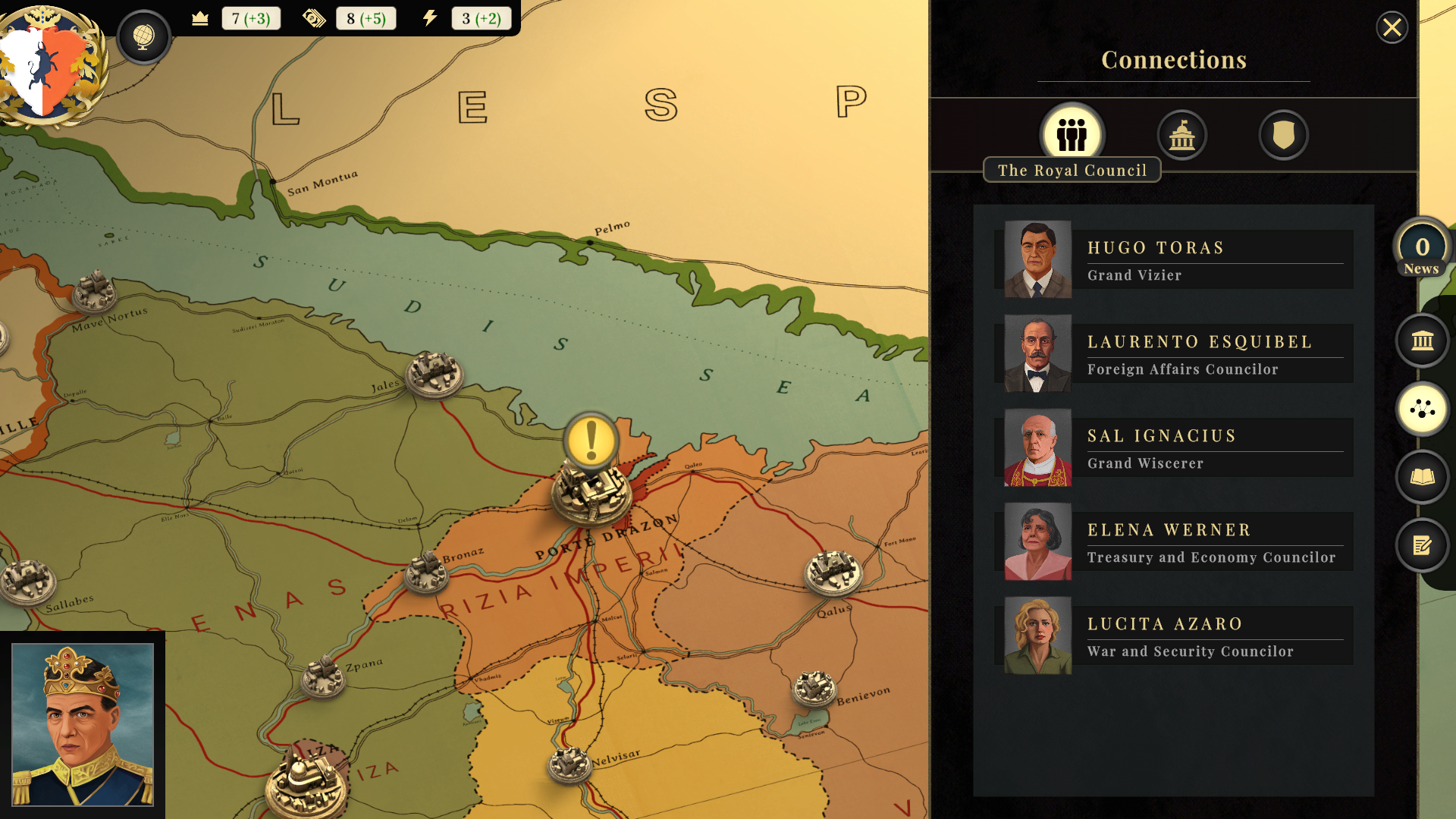
In terms of gameplay, Rizia remains quite heavy on the text side of things but a few additions have been made to give this campaign its own feel. Most notably is the new resource system, which divides your ability to make decisions and and pass laws between your Authority, Budget, and Energy. Unlike with Sordland you cannot go into debt to enact whatever you want, so carefully maneuvering to obtain further sources of these stats is critical, as well as knowing when to spend and when to save. This is considerably easier to plan around in the kingdom however, as instead of signing or vetoing bills you instead make game changing decisions through Decrees. Decrees do not need immediate approval, and can be enacted at almost any time in the story.
The system makes managing your country far more controlled and simple, though it does encourage some weird play patterns. For example players have found that saving certain Decrees for the penultimate turn of the game makes it so you can play with more resources than you otherwise would have if you approved expensive programs to help the citizenry, only to implement those programs at the last second and go from impending coup to contented kingdom just like that. Even on casual a play-through I find that you’ll want to save passing Decrees for the end of any given turn so you can have more free choice to spend or not spend resources (especially Budget) on the various events that pop up in the story that do require immediate decisions to be made, rather than actually passing Decrees amidst a turn like a leader realistically would be moved to do. Still, compared to the base game Romus truly feels like a king who can take whatever steps he sees fit to solve his country’s problems thanks to Decrees, and it’s more positive than negative.
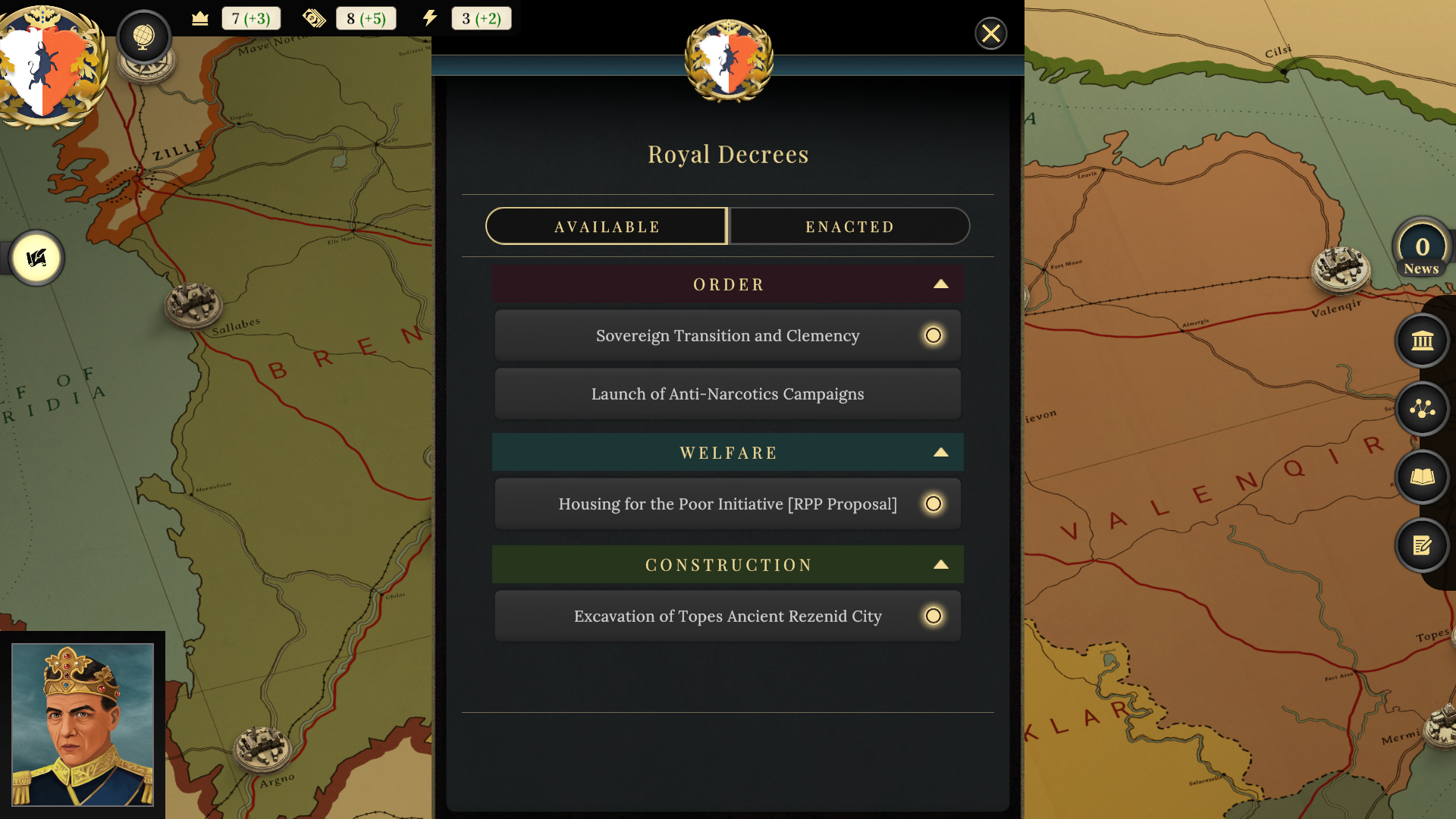
The other major mechanic of note is the revamped military system. For most of the game you receive manpower and equipment that you can queue to become fully usable military divisions, which can raise your Authority modifier through power projection at the cost of lowering your Budget modifier if you prepare a large volume of troops. When conflicts get hot you can also choose to influence the outcome of the battle through a military strategy minigame. The passive resources aspect of the army is quite fine, and reflects the reality that a military need not be deployed to have an effect on one’s rule, but the military minigame is more hit or miss. Experienced strategy gamers are pretty good at exploiting the system, but personally I can hardly find opportunities to actually engage with the system.
One of the stipulations of the DLC is that it needs to avoid contradicting the base game where it can, with the Sordland campaign even having light effects on the Rizia one if you trigger the right events. Unfortunately one of the major limitations is that you can’t exactly start wars with anyone involved in the Sordland campaign, and this leaves the mechanic very restricted in areas it naturally seems like a reasonable option. There’s really only one country you can actually go to war against, and of all Southern Merkopa it’s probably the one that needs a military solution the least. Sure I used the military against them a little bit as a deterrent, but nothing so brazen as actually firing upon them. Overall the changes in Suzerain: Rizia leave us with a second campaign which is admittedly easier to find success in and not every new idea is executed perfectly, but has even more freedom in terms of the direction you want to take the country.
Politics, Spiritual Value, and Conclusion
Before everything is settled it’s worth offering some words on the game’s politics, just in case there are any concerns about the game’s themes. Fortunately for us the underlying political biases are for the most part subtle enough that the average player will find the game fairly self-contained and not overly preachy. However there are at least a few things that I do feel compelled to discuss in case the more subtle things give cause for pause. I already briefly touched on the game’s feminist themes in the article proper and how the game holds Anton’s family life hostage with it, but really the family stuff is the only strictly obnoxious part about it (involvement of professional complainer Ciara Walda notwithstanding) and the rest is largely uncontroversial compared to what modern feminism has evolved into. It will be said that Monica especially seems to act like women being mothers and wives is the most dramatically terrible and dehumanizing thing ever so there’s a LITTLE bit of modern feminism injected in there, but honestly that just makes some of her dialogue unintentionally funny in how anti-woman it sometimes is. Of course women should have the freedom to be pursue the vocations they are called to, but failing to celebrate the beautiful role of mother is just as bad a mistake as keeping women away from other vocations by virtue of their sex alone.
Less innocuous is the game’s handling of Malenyevism, which is the fiction’s equivalent to Marxism. Countries falling under the sway of the communist sphere of influence are almost without exception portrayed as admirable humanitarians with solid track records, a far cry from the disastrous revolutionary states of reality who often chose the starvation of the proletariat over admitting their ideals weren’t working. Granted it is also canon to the Suzerain-verse that free speech and international transparency in communist/socialist countries are below average so there is a level of plausible deniability to their image, but if we ever do get a peek behind the curtain I doubt we’ll see any critiques of Malenyevism that the game won’t also try and mitigate. The Arcasian Capitalist sphere certainly isn’t portrayed exceptionally flatteringly, although on this front there are legitimately good points of criticism too.
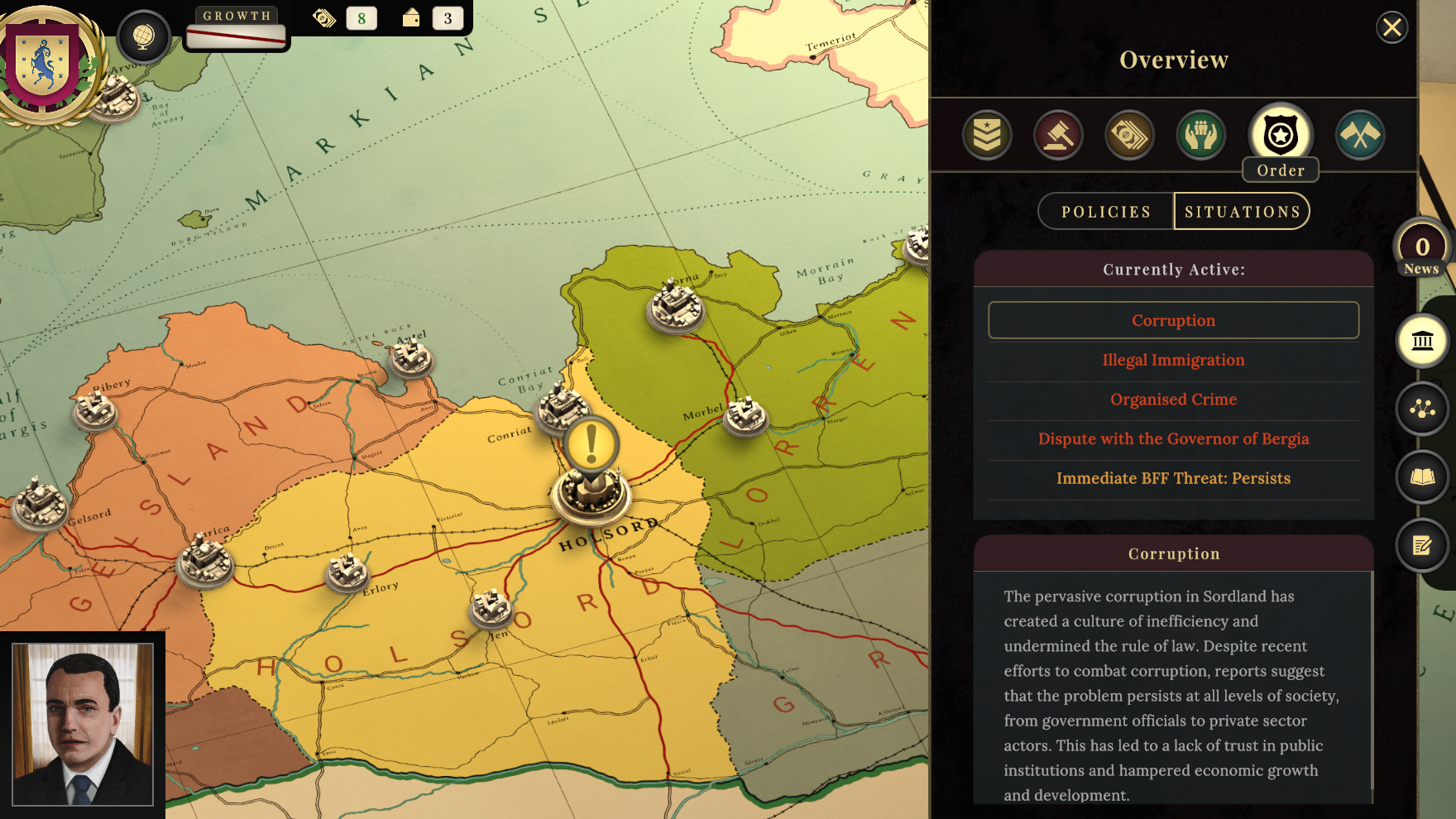
The only other point of note on the political front is that the conservative side of Sordland’s cast is generally portrayed as more flawed and sinister than their liberal counterparts, in most of the ways you probably expect. I’m not about to sit here and say that the game should be kinder if you unconditionally help out with A Funny Guy’s Bear Trap or aim to create a dictatorial constitution, because those are questionable choices to put it mildly. I do think, however, this is yet another example of people not understanding that you can in fact care about the interests of the traditionalist and/or local population without being a jerk. Maybe we can charitably assume that’s where the player’s interpretation of Anton could come in to fill the gap if they chose to roleplay a normal conservative, but this still highlights the fact that the bias was not kept in check for the other characters. At least the Rizia campaign is much better in this regard, as most of the conservatives have more complex characterization and you can condemn what Su Omnia has become while still coming off as consistent.
Lastly, as for the wisdom we can take from Suzerain, I return to my introduction’s musings on perspective. We live in an era where many people feel the need to take the decisions of our leaders in government at face value, compounded further by the digital age enabling the powerful to control the narrative like never before. It was this reality that I was reminded of when playing through Suzerain, as I thought of the many ways my actions were constantly misconstrued by the people around me and how things could have ended better if people just heard me out. Of course to believe that oneself can be perfectly understood like this is a pure pipe dream, but perhaps we need not resign ourselves to living idly in someone else’s narrative either. To take a relatable example, the seventh chapter of the Gospel of St. Matthew is infamous for being taken out of context and weaponized against Christians by non-Christians, so much so that I legitimately worry some of my readers will cringe a little in hearing me use it as a point of discussion. Yet this very chapter exists both as an antidote to the political narratives that affect our zeitgeist as much as it is a victim of a dishonest narrative in itself.
The famous “Judge not, that you may not be judged,” (St. Matthew 7:1) is not the excuse to censor Catholics from entering into moral discussions many secularist adherents claim it to be. Rather St. Matthew 7:2-5 shows us that we are warned by Lord Jesus against judging without self-reflection and generosity, being aware that your own internal sinfulness and bias can affect your judgment, and working to be as free of those hindrances as possible when commenting on the behavior of others. And while charity is as always the ultimate key here, even this charity is not to be given out foolishly as in St. Matthew 7:6 Jesus says: “Give not that which is holy to dogs; neither cast ye your pearls before swine, lest perhaps they trample them under their feet, and turning upon you, they tear you,” clearly showing that this restraint our our part isn’t something to be held to a suicidal level. Here I reclaim the truth behind Christ’s words, and encourage us to defeat the lies others would have us believe about ourselves provided we accept the responsibilities contained therein. Judge others the way you want to be judged. Make no mistake that politicians very much need to be scrutinized given the terribly important nature of their work, but Suzerain reminded me that politicians and rulers are people with often complicated reasons for their behavior too, and we mustn’t let surface level appraisals get in the way of making appropriately measured judgements.
In conclusion, Suzerain and Suzerain: Rizia are a set of games that truly appeal to the storytelling crowd of gamers, to the point where I’m sure many would regard them more like an evolution on Choose Your Own Adventure books than traditional games. If this doesn’t bother you however, this gem of an indie game is a wildly entertaining experience with dozens of story permutations, hidden events, and memorable moments that simply begs for multiple runs if you have the time. If your attention span is yet unravaged by TikTok and you enjoy a good ‘choices matter’ romp, Suzerain might just become a new favorite of yours. Just remember: CSP is cringe, ATO is cope, long live GRACE. Glovurius axa Jesus!
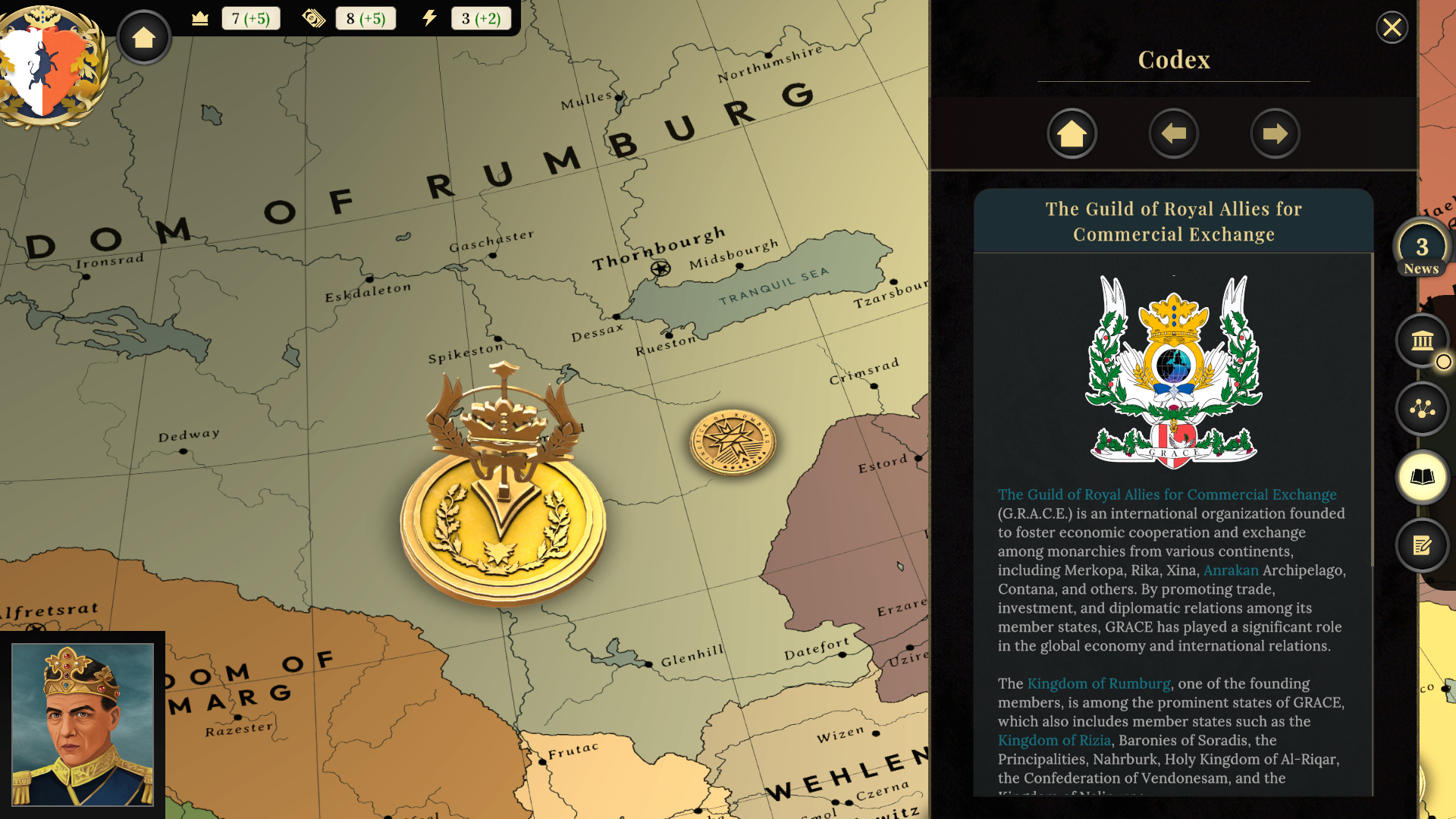
Scoring: 84%
Gameplay: 3/5
Story: 5/5
Art and Graphics: 3/5
Music: 5/5
Replayability: 5/5
Morality/Parental Warnings
Suzerain is a political simulation game focused on an interactive narrative about all else. Visually speaking the game features very little if anything untoward, but the contents of the story itself does regularly touch on mature themes. As a political leader your responsibility is to make major decisions about the government’s activities, and some of your decisions can get really extreme. Things like aiding in the Republic of Whelen’s ethnic cleansing campaign, employing chemical weapons in warfare, and wielding the power of the state to frame and punish your political enemies are all things the game allows you to do among other options. The game doesn’t celebrate such actions, but they are still offered to enhance the themes of the story. In the Rizia campaign you can get into some pretty heated romantic situations with your potential love interests, one of which is a man. Sexualization is otherwise pretty rare, but adultery does become a plot point during one of the campaigns and the player is allowed to make excuses for it.
The religions in the game are fictional and don’t really draw strong parallels to any from real life, but it will be mentioned that the Golcondists are warmongering, misogynist, homoerotic heretics whom the game tries to garner sympathy for by tying them to the persecuted Bluddish minority. The game also misrepresents the evolution vs creationism debate at one point, implying that it’s a bunch of rational evolutionists vs fantastically zealous creationists, when in reality it’s a far more nuanced topic which the Catholic Church herself has encouraged us to come to our own conclusions on. Foul language is fairly rare, but when used it often jumps right to some of the strongest English curse words. One of the endings gives Rayne the option to kill himself.
